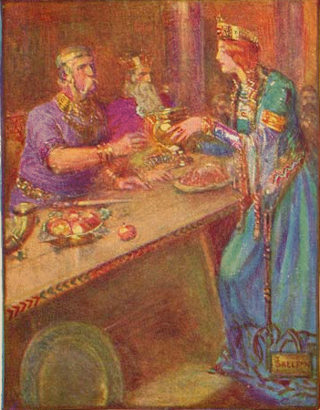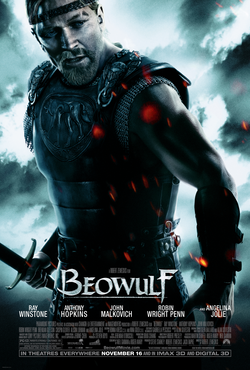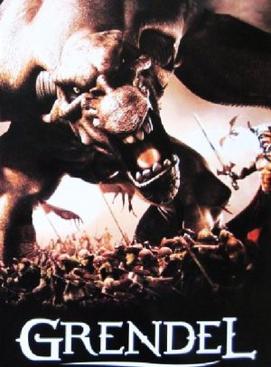
Beowulf is an Old English epic poem in the tradition of Germanic heroic legend consisting of 3,182 alliterative lines. It is one of the most important and most often translated works of Old English literature. The date of composition is a matter of contention among scholars; the only certain dating is for the manuscript, which was produced between 975 and 1025 AD. Scholars call the anonymous author the "Beowulf poet". The story is set in pagan Scandinavia in the 5th and 6th centuries. Beowulf, a hero of the Geats, comes to the aid of Hrothgar, the king of the Danes, whose mead hall Heorot has been under attack by the monster Grendel for twelve years. After Beowulf slays him, Grendel's mother takes revenge and is in turn defeated. Victorious, Beowulf goes home to Geatland and becomes king of the Geats. Fifty years later, Beowulf defeats a dragon, but is mortally wounded in the battle. After his death, his attendants cremate his body and erect a barrow on a headland in his memory.

Hrothgar was a semi-legendary Danish king living around the early sixth century AD. Many years later, Hrothgar paid money to the Wulfings to resolve a blood feud they had with Ecgtheow, Beowulf's father.

Heorot is a mead-hall and major point of focus in the Anglo-Saxon poem Beowulf. The hall serves as a seat of rule for King Hrothgar, a legendary Danish king. After the monster Grendel slaughters the inhabitants of the hall, the Geatish hero Beowulf defends the royal hall before subsequently defeating him. Later Grendel's mother attacks the inhabitants of the hall, and she too is subsequently defeated by Beowulf.
Wiglaf is a character in the Anglo-Saxon epic poem Beowulf. He is the son of Weohstan, a Swede of the Wægmunding clan who had entered the service of Beowulf, king of the Geats. Wiglaf is called Scylfing as a metonym for Swede, as the Scylfings were the ruling Swedish clan. While in the service of the Scylfing Onela, king of the Swedes, Weohstan killed the rebel prince Eanmund and took his sword as a trophy; Wiglaf later inherited it. Weohstan belonged to the clan of the Wægmundings, the same clan Beowulf's father Ecgþeow belonged to; so Wiglaf is Beowulf's distant cousin, and his only living relative at the time of Beowulf's death.

Wealhtheow is a queen of the Danes in the Old English poem, Beowulf, first introduced in line 612.

Beowulf is a 1999 American science fantasy-action film loosely based on the Old English epic poem Beowulf. The film was directed by Graham Baker and written by Mark Leahy and David Chappe. Unlike most film adaptations of the poem, this version is a science-fiction/fantasy film that, according to one film critic, "takes place in a post-apocalyptic, techno-feudal future that owes more to Mad Max than Beowulf." While the film remains fairly true to the story of the original poem, other plot elements deviate from the original poem.

Beowulf is a 2007 American adult animated fantasy action film produced and directed by Robert Zemeckis, written by Neil Gaiman and Roger Avary, based on the Old English epic poem Beowulf, and featuring the voices of Ray Winstone, Anthony Hopkins, Robin Wright, Brendan Gleeson, John Malkovich, Crispin Glover, Alison Lohman, and Angelina Jolie. The film depicts the rise and fall of the warrior Beowulf after he travels to Denmark to kill a monster. It was produced by Shangri-La Entertainment and Zemeckis's ImageMovers and features characters animated using motion-capture animation, which was previously used in The Polar Express (2004) and Monster House (2006).

Grendel's mother is one of three antagonists in the anonymous Old English poem Beowulf, the other two being Grendel and the dragon. Each antagonist reflects different negative aspects of both the hero Beowulf and the heroic society that the poem is set in. Grendel's mother is introduced in lines 1258b to 1259a as: "Grendles modor/ides, aglæcwif".

Grendel Grendel Grendel is a 1981 Australian animated film written, directed and designed by Alexander Stitt and starring Peter Ustinov. It was based on John Gardner's novel Grendel. The music was composed and conducted by Bruce Smeaton and has been released on the 1M1 Records label.

In the Old English epic poem Beowulf, Unferth or Hunferth is a thegn of the Danish lord Hrothgar. He appears five times in the poem — four times by the name 'Hunferð' and once by the appellation "the son of Eclafes". The name Unferth does not appear in any Old English manuscript outside of the Nowell Codex, which contains Beowulf, and the meaning of the name is disputed. Several scholarly theories about Unferth have been proposed. Unferth is also the name of a character in the modern novel Grendel by John Gardner, based upon the Beowulf epic.

Grendel is a 1971 novel by the American author John Gardner. It is a retelling of part of the Old English poem Beowulf from the perspective of the antagonist, Grendel. In the novel, Grendel is portrayed as an antihero. The novel deals with finding meaning in the world, the power of literature and myth, and the nature of good and evil.

Grendel is a 2007 American action-fantasy television film directed by Nick Lyon and very loosely based on the Old English epic poem Beowulf. The television film was produced by the Sci Fi channel as an original movie for broadcasting on the Sci Fi cable television network, and began airing on January 13, 2007. In 2010 it was released on DVD from the sister company by Universal Pictures.

Beowulf: The Game is a 2007 action-adventure video game developed by Tiwak and Ubisoft and published by Ubisoft. It was released for Microsoft Windows, PlayStation 3, PlayStation Portable and Xbox 360. It is based upon the 2007 film Beowulf, which in turn was based upon the epic poem of the same name. The characters are voiced by the original actors who starred in the film.

The final act of the Anglo-Saxon poem Beowulf includes Beowulf's fight with a dragon, the third monster he encounters in the epic. On his return from Heorot, where he killed Grendel and Grendel's mother, Beowulf becomes king of the Geats and rules wisely for fifty years until a slave awakens and angers a dragon by stealing a jewelled cup from its lair. When the angry dragon mercilessly burns the Geats' homes and lands, Beowulf decides to fight and kill the monster personally. He and his thanes climb to the dragon's lair where, upon seeing the beast, the thanes flee in terror, leaving only Wiglaf to battle at Beowulf's side. When the dragon wounds Beowulf fatally, Wiglaf attacks it with his sword, and Beowulf kills it with his dagger.

Beowulf: A Translation and Commentary is a prose translation of the early medieval epic poem Beowulf from Old English to modern English. Translated by J. R. R. Tolkien from 1920 to 1926, it was edited by Tolkien's son Christopher and published posthumously in May 2014 by HarperCollins.
J. R. R. Tolkien, a fantasy author and professional philologist, drew on the Old English poem Beowulf for multiple aspects of his Middle-earth legendarium, alongside other influences. He used elements such as names, monsters, and the structure of society in a heroic age. He emulated its style, creating an impression of depth and adopting an elegiac tone. Tolkien admired the way that Beowulf, written by a Christian looking back at a pagan past, just as he was, embodied a "large symbolism" without ever becoming allegorical. He worked to echo the symbolism of life's road and individual heroism in The Lord of the Rings.












